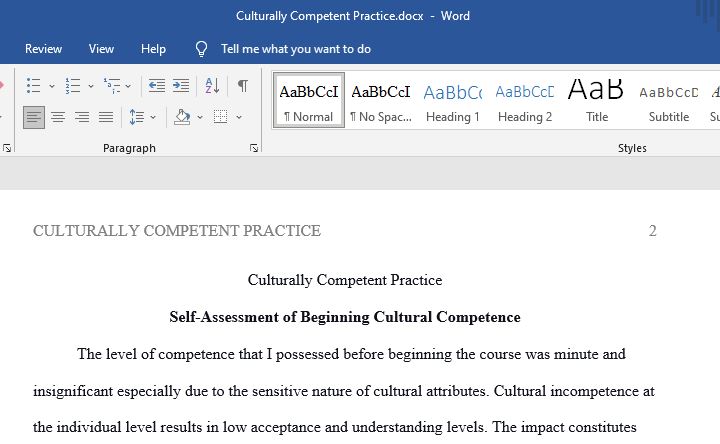Describe a Personal Work Plan for Culturally Competent Practice
Self-assessment of beginning cultural competence
Describe the level of competence you had when you started the course. What experiences had particularly shaped you views of your own culture and the culture of others? Cite literature and use relevant theoretical concepts in your analysis.
What have you learned in the course?
Highlight succinctly things you learned while participating in this course that were most meaningful for you. What aspects did you already know? What challenged your preconceptions? What piqued your curiosity and made you want to learn more? What questions were aroused in your mind that would merit further investigation and exploration?
What does this mean for your practice?
Types of clients you could help. Discuss how what you learned about cultures and families relate to your previous and current work experience. What groups and culture do you want to learn more about so that you might more effectively provide social work services?
Describe any population with which it may be difficult for you to work/analyze the reason for this. State whether this is something that you feel that you should overcome, and whether you should do something to make it easier for you to work with this population.
What more do you need to know?
Describe what more you want to learn about other cultures and diverse families. Discuss some of the ways that knowledge could be effectively acquired. You may want to document your statement with information you have acquired about certain populations, societal need, and resources for developing cultural competence.
Action Steps
List three to five actions that are reasonable and feasible for you to do that will increase your cultural competence.
Note:
The name of the course is Diversity & Social Justice and some of the content that was covered were
1. Understanding strategies for advancing human rights for all through the promotion of social and economic justice.
2. Identifying personal ethics in
3. Identifying classism in social work practice
4. Learning about sexual orientation and the impact it can have on individuals lives. And how to be aware of sexual orientation and how to work with clients in a way that makes them the expert in their own experiences.
5. Learning about racial and ethnic diversity and social justice and identify why these concepts are important in social work practice.
6. Learning about how to integrate your beliefs, values and behaviors into ethical and culturally competent social work.
Links to Sources:
https://socialworkmanager.org/press-blogs/news/diversity-in-social-work-management-and-practice/
https://www.socialworkers.org/LinkClick.aspx?fileticket=PonPTDEBrn4%3D&portalid=0
https://careertrend.com/diversity-issues-social-workers-26365.html
https://classism.org/about-class/what-is-classism
https://www.socialworker.com/feature-articles/practice/human-rights-and-social-work-values/
Requirements: 2-3 pages | .doc file
Answer preview:

word limit:683
